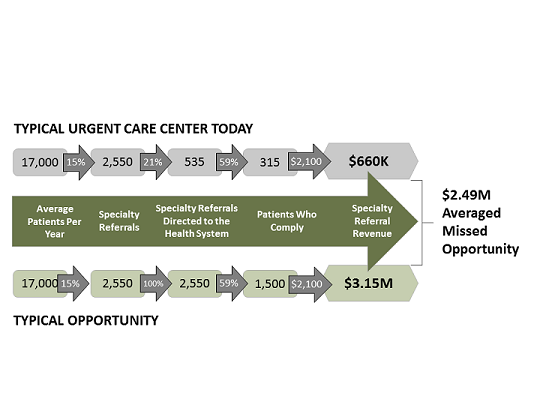Health system leaders are missing an opportunity to connect urgent care centers to their systems of care.
A 2015 nation-wide survey showed healthcare providers are not actively coordinating the growing urgent care primary care channel or effectively managing the downstream referrals.1
The survey of 1,400 urgent care patients, conducted by the University of Minnesota and Minneapolis-based Urgent Care Partners (UCP), found that urgent care patients tend to comply with their clinicians' advice on where to go for their recommended follow-up care. While not every patient is advised to have follow-up care, when follow-up was advised and when a specific provider was recommended, 66 percent of patients sought follow-up with the recommended provider. However, urgent care providers do not typically refer to specific providers. According to the same survey, of the 76 percent of patients advised to have some kind of follow-up care, only 21 percent of patients were recommended a specific provider or health system.
Coordinating the urgent care channel and managing downstream referrals presents a unique opportunity for health systems wanting to reach new patients. Forming relationships that cause urgent care providers to refer patients to a specific provider could generate substantial specialty volume. Moreover, since few are doing it today, the health system that figures out how to create an easy referral process for urgent care centers will likely garner a majority of referrals. For specialty referrals, the UMN/UCP survey showed 15 percent of the survey respondents were referred to a specialist and 59 percent complied.
Today with urgent care centers averaging nearly 17,000 patients per year, the typical urgent care center might make 2,500 specialty referrals annually with nearly two-thirds of these patients complying. On average, the survey showed only about 300 (21 percent) are being directed to a specific provider or health system. As a result, urgent care centers and their owners are missing an opportunity to coordinate with the system of care that is best for their patients.

For health systems, this translates into a missed revenue opportunity - an estimated $22B of healthcare revenue nationally per year.2
Health systems contemplating an urgent care strategy should consider not only the profitability from the efficient operations of a modern retail urgent care model, but also the significant downstream potential an urgent care center generates.
About Urgent Care Partners
Urgent Care Partners teams with health systems to build health system-owned urgent care capabilities and infrastructure.
About Health System Advisors
Health System Advisors advises hospital and health system leaders on their strategic issues. HAS provides analysis, insight, and expertise as we facilitate leadership teams to new ways of thinking and strategies that advance their organizations and thereby transform the industry.
About the UMN/UCP Survey
The survey conducted by the University of Minnesota and Minneapolis-based Urgent Care Partners (UCP) included more than 1,400 recent urgent care patients and more than 40 in-depth interviews with health system leaders and other subject matter experts.
About the Authors
Mitch Traczyk is a Strategy Consultant with Health System Advisors.
Luke C. Peterson is Vice President of Innovation at Urgent Care Partners and a Principal at Health System Advisors.
1 UCP Urgent Care Survey – December 2015
2 $13B of hospital and physician revenue includes both professional and technical fees of the first and second order specialty and ER downstream referrals, using $2,100 which is the approximate weighted average revenue per case of outpatient and inpatient specialty visits
The views, opinions and positions expressed within these guest posts are those of the author alone and do not represent those of Becker's Hospital Review/Becker's Healthcare. The accuracy, completeness and validity of any statements made within this article are not guaranteed. We accept no liability for any errors, omissions or representations. The copyright of this content belongs to the author and any liability with regards to infringement of intellectual property rights remains with them.


